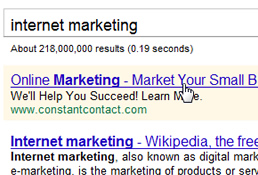Posts Tagged ‘website’
Description of ‘website’ Tag:
Thursday, October 13th, 2011
Updating a website refers to the addition or modification of content as well as the actual design and layout of the website. Stale websites can quickly discourage web visitors and are one of the major reasons behind high bounce rates. A bounce occurs when a visitor quickly views the page that they have landed on and then decides to leave the site rather than exploring its other web pages. 
How often should you be updating your website:
So, how often should you be updating your website? There aren’t any set expectations for how often a website should be updated. However it is suggested that you perform updates as frequently as possible in order to prevent your website from looking dated and losing your valuable web traffic. It is recommended that you try to update your website at least 1 to 2 times a month. These weekly or monthly updates should be designed for only adding or refreshing content unless the entire website’s design is fatigued. As long as you develop a site that is both visually appealing and easily accessible then your primary updates should focus solely on your content.
When asked, most webmasters and search engine marketers agree that the more you update your content the more impact it will have on your Search Engine Optimization. Updating is especially helpful when it comes to blog content. Continuously adding new blog posts leads to more of your pages being indexed and draws in more visitors and potential customers.
Reasons for Updating Your Website:
- Updating provides your visitors with a visually appealing user experience.
- Updating your website establishes fresh and relevant content.
- Updating helps your website get indexed more often.
- Updating attracts new traffic.
- Updating increases rank and influences other websites to link to your website.
Tips for Updating Your Website’s Design:
… Read the rest
Tags: content, Design, seo, update, website, website content, website design
Posted in Web Development, Web Hosting, Web Tips | No Comments »
Friday, August 26th, 2011
One of the most important elements of creating a website is selecting a proper domain name. A domain name is commonly part of a larger Internet address called a “URL”. Having the right domain name for your website can significantly help establish an online reputation and generate greater visibility. Domain names give both the human visitors as well as the search engines the first description or impression of the website. Choosing a domain name can often be just as important as deciding the name of your business and should not be taken lightly. Finding a successful domain name will require time, patience, and creativity. The following tips are designed to assist in creating successful domain names.
Best Practices for Creating a Domain Name:
- Describe Your Website by Matching Your Domain, Website, and Company Name
A domain name is one of the first elements of a website that visitors see. Matching your domain with your company name will help target your existing as well as potential customers. Having a company and domain that describes your website will also let people know what the website is about and draw in targeted traffic. For example with the domain www.DeliciousPastries.com Delicious Pastries is the company name, website name, domain name, and also highlights Pastries a major descriptive keyword.

- Keep it Short and Readable-
There are several incentives for keeping your Domain name short which include it being easy to type, easy to remember, and easier to travel by word of mouth. A domain name that is longer than 3 words should use hyphens. However a domain name with more than 3 words and hyphens will raise the websites level of spamminess.
Having a keyword in your domain name will help rank not only because it is part of your domain but also because it is the anchor text that others will use to link back to your website.
- Alternative Domain Top Level Domains (TLD)
It’s recommended that you only purchase the .Com version of your… Read the rest
Tags: domain, domain names, internet, keywords, seo, url, urls, website
Posted in Internet Marketing, Search Engine Optimization SEO, Web Development | 1 Comment »
Friday, August 19th, 2011
One of the most important and easiest Search Engine Optimization concepts is keyword placement. SEO Keyword placement refers to the integration of targeted keywords into locations on and off the webpage. Keywords or key phrases are generated to represent the terms that users search for when trying to locate your company and website. A website using the wrong or inaccurate keywords is as equally bad as a website that ignores keywords all together.

Keyword Cloud
Having accurate and descriptive keywords however is only the first part of the equation. Once you establish a list of relevant keywords they then need to be strategically placed throughout the website in order to increase traffic. Each individual page of your website should be optimized for one to three unique keywords. Selecting keywords along with the placement of these keywords is crucial in order to increase your website’s visibility and guide targeted traffic directly to your website. Below are the 10 most important positions to consider when performing keyword placement.
Where to Use Keywords:
It is recommended that you always place your keywords near the beginning of the title tag. Not using your keywords in the website’s title tag can make it extremely difficult to rank for your targeted keywords. Keyword placement in the title tag is thought to be the most important search engine ranking factors, each page title should be unique to that page and optimized for that specific keyword.
Although the Meta Description Tag seems to play a very little role in the actual search engine ranking it can still be used to influence potential customers to visit your website. Any keywords that your description tag has in common with the search query will appear bolded in the Search engine results page (SERP). Similar to the title tag each page should also have a unique description tag that targets only 1-2 keywords.
… Read the rest
Tags: Internet Marketing, keyword, keyword placement, keywords, Links, search engine, seo, website
Posted in Internet Marketing, Search Engine Optimization SEO, Web Tips | No Comments »
Friday, April 22nd, 2011
Search engines take into consideration a large number of factors when assigning a rank to a website. Although there are a number of factors that are obvious or specifically identified as ranking factors, the majority of the ranking criteria are kept private. Search engines avoid publicizing the exact pieces of the Search Engine Optimization puzzle that they use to determine a rank because it would most likely lead to a massive overflow of irrelevant search results.
Search Engines recognize that if all the sites on the Internet knew the characteristics that they use, then every site would be able to rank higher. Providing this information would make it too easy for website and go against their main goal which is to provide users with the most relevant and useful search results. Clearly expressing the measurements that are used to rank a website would prevent a relevant site from standing out amongst the other results and could potentially place a higher rank on a page that is worst or is less relevant to a user.

Search Engines use both on-the page as well as off-page elements to assign a rank. On-page factors usually focus on internal site structure including keyword use and internal linking where as an off-page aspect considers who you link to, how you link to them, and the popularity or relevance of your links. Some of the factors that are known or thought to be important to ranking well in search engines include:
- Keyword in the pages Title Tag.
- Appropriate and descriptive anchor text of Inbound Links.
- Global Link Popularity of Site.
- Age of domain.
- Link Popularity or equity within the internal link Structure.
- Relevance of an inbound link to the site and the text surrounding that link.
- Keyword use throughout the body copy.
- The popularity or authority of the website providing an inbound link.
With that being said, one of the major factors that search engines do directly distinguish as being harmful to a Websites rank is Duplicate Content. Duplicate Content is best described as a portion or… Read the rest
Tags: content, duplicate, duplicate content, inbound link, link, rank, search, search engine, website
Posted in Internet Marketing, Search Engine Optimization SEO, Web Tips | No Comments »
Wednesday, March 16th, 2011
Google’s Blog recently announced a new method for customizing their user’s search experience, which will be available soon.
March 15, 2011 from http://googleblog.blogspot.com
Recognizing that the search results they provide may not be a perfect match, Google is now providing a search site-filter. Initially, Google released this feature as a part of their Google Chrome web browser in January 2011. Seeing that about 15% of Internet users browse using Google Chrome, Google recognized the benefit of offering this feature in their search engine in addition to Google Chrome (see Chrome market share).
Providing this personalized site-filtering feature enables users to avoid unrelated information and block undesirable websites from appearing in their search results. Whether it is because the website is offensive, low quality, or if a customer just doesn’t like it, they now have the option to exclude it from their search results. This feature is now available for people using Google Chrome version 9+, Internet Explorer 8+, and Firefox versions 3.5+ Internet browsers.
Search Results
Although this feature provides customers with a better search experience, could this be used to determine the future rank of a website? In their blog, Google states that they may eventually evaluate and use the data from this feature as a signal for ranking. Presently they are only attempting to offer customers an easy and more controlled search tool.
How It Will Work
When using a compatible browser the person performing the search will notice a “Block all example.com website results” next to the “cached” and “similar” links. These links are located next to the websites URL following the description. After receiving a confirmation request to block the site the results will be hidden until the user decides to deactivate the block. Once blocked, if the search results contain a blocked website a message is then displayed to the user stating some of the results have… Read the rest
Tags: browser, Chrome, filtering feature, Google, internet, results, search, site blocking, website
Posted in Browser, Search Engines | No Comments »
Friday, February 25th, 2011
 The time that it takes for a website to load is commonly referred to as site speed. Site speed is measured from the moment a link is accessed or after a URL is entered into the browser search. Depending on the type of website or how heavy its content is, a site’s speed is typically between 2-5 seconds. At any rate below 2 seconds a website’s speed is thought to be excellent. A speed between 2-5 seconds might not be the fastest, however it is perfectly acceptable. Anything taking 5 seconds to load can annoy or turn away visitors and be less popular with search engines. The time that it takes for a website to load is commonly referred to as site speed. Site speed is measured from the moment a link is accessed or after a URL is entered into the browser search. Depending on the type of website or how heavy its content is, a site’s speed is typically between 2-5 seconds. At any rate below 2 seconds a website’s speed is thought to be excellent. A speed between 2-5 seconds might not be the fastest, however it is perfectly acceptable. Anything taking 5 seconds to load can annoy or turn away visitors and be less popular with search engines.
A site’s speed is only one of the many factors that search engines utilize in their website ranking algorithm. Search engines employ ranking algorithms in order to assign a page rank to a website and to ensure that a search returns with the best and most relevant results. The following are options that site owners can apply to their sites in order to reduce the time it takes for their website to load. Reducing a sites load time or increasing a sites speed will generate better customer responses as well as appeal more to search ranking algorithms.
Before attempting the following suggestions you should try out these free tools to see how your site measures up. Pingdom Load Time Test is an easy tool that allows you to assess the speed or your website. The program GTmtrix analyzes site speed, provides a grade for your website and generates a list of potential problems that they recommend that you fix. These are just two of the many free tools available to measure the performance of your website. Upon completion of these tests, if you are unsatisfied with your websites performance we recommend implementing the following changes.
Compress your Website:
Website data compression converts all of a website’s text elements that are written in HTML, CSS, and JavaScript into bundles. After the compression process is complete websites no longer have to send and recognize each individual file.… Read the rest
Tags: search, search engine, site, speed, website
Posted in Search Engine Optimization SEO | 1 Comment »
Friday, February 11th, 2011
Advertising in any form has the goal to attract more customers and more revenue. Like advertising on television or in print ads, the world of online advertising shares the same purpose.

Basically online advertising sets out to attract customers by using the Internet, with websites and search engines as their medium. The Pay per Click (PPC) advertising model is where a host is compensated each time the promoter’s advertisement is clicked. The Cost per Click (CPC) is the actual amount that is paid out by the advertiser to either the search engine or website owner for each click that occurs. Websites that utilize this type of advertising will often present an advertisement or text link, when there is a common term between the websites keyword query and the advertiser’s keyword list. In other words, when a website has related information to the advertiser, a link will be displayed either on the side or above or in line with the website’s original content depending on the website. There are a couple different variations of pay per click online advertising which include Cost per Mille (CPM ), Cost per Visitor (CPV), Cost per Lead (CPL), Cost per Click (CPC), and Cost per Action (CPA).
When performing a search at a search engine you may have noticed that the results return with sponsored links. The sponsored links appear at the top or sides and the advertisers pay to be in these sponsored links sections. Each time a visitor accesses the site through this link, money is paid to the search engine through a prepaid account with that search engine. In order to achieve a sponsored link location websites, advertisers place bids for the amount of money they are prepared to pay per click. Since there are multiple link positions available, the highest bid is placed at the top, the next highest is placed second and so on. In addition to the websites being able to determine how much they pay per click they can also specify how much they… Read the rest
Tags: advertising, cost, engine, money, search, service, site, website
Posted in Internet Marketing, Search Engine Optimization SEO | No Comments »
Friday, January 28th, 2011
How to Measure the Value of A Link!
If you are familiar with the  inner workings of a Search Engine then you probably know that search engines calculate the standing of your website using a number of different factors. Link value analysis is among these factors, which is derived from the quantity and reputation of the other web pages that link to your website. In addition to examining the popularity of connected pages, search engines analyze a website’s primary characteristics such as trustworthiness, spam level (is your website useful), and perceptible authority (legitimacy). inner workings of a Search Engine then you probably know that search engines calculate the standing of your website using a number of different factors. Link value analysis is among these factors, which is derived from the quantity and reputation of the other web pages that link to your website. In addition to examining the popularity of connected pages, search engines analyze a website’s primary characteristics such as trustworthiness, spam level (is your website useful), and perceptible authority (legitimacy).
In order to grow the popularity of your website, generate awareness, and increase traffic from search engines it is important to perform link building and analysis. So how do you know the value of a link? Although search engines keep the majority of their ranking factors private, some of the clearer and more notable factors include the following.
- Global Reach: If you want to have a link from a website to your website (a backlink), does that website have quality backlinks to other quality websites, in other words does that website have importance, reach, and scope. Nothing is more impressive than having a well know and hard hitting website in your corner!
- Community Merit: Equally important to websites with global reach are topic specific links that hold merit and commonality to the website on a topic level. Web sites that are in the same business or cover similar topics and industries can provide a stable ranking foundation.
- Anchor Text: Using anchor text is both important on inbound links to your website and navigational links within your website. A well built website can rank higher by using keywords in their anchor text. This anchor text should both describe the link and be a representation of the general content on the target page. It is additionally helpful to use keywords in the anchor text of links guiding traffic to your website. The more onsite and offsite links to your
… Read the rest
Tags: anchor text, backlink, internet, link, website
Posted in Backlinks, Internet Marketing, Search Engine Optimization SEO | 2 Comments »
Friday, January 21st, 2011
In our private lives, we all have our daily online routines. We check and send email, visit our favorite sites, read a few articles, and countless others.
Why should our Online Business Activity be any different?

If you own a business there are certain basic recommendations for daily online activity that could help generate more clients. The Internet is a powerful resource for any business and neglecting to utilize all that it offers is silly. Every business can be conducting some kind of daily activity online. Not sure how to fully utilize the Internet for your business? The following are minimal suggestions for your company’s daily Internet practices.
- Visit Some Social Networking Websites:
Submit some postings to multiple sites and gain a following in the online community. Use this online activity to share some knowledge and build a reputation for your business. By improving the brand of your business on Facebook, you’re able to market your company and have the opportunity to acquire profitable insights from others. It’s free, except for your time, so take advantage of the free advertising that websites like Facebook and Twitter offer. In addition using these social networking sites gives you another medium to allow you to be more accessible to your customers and gain valuable feedback. See more information about how Twitter Can Benefit Your Business.
- Write a Blog:
Establishing a blog for your business is a great way to branch out and grow your web presence. A blog is another way to obtain customer interaction as well as communicating important messages to your clients. Additionally, mention your blog articles on Social Media websites like Twitter and Facebook and have more potential clients visit your website. For more on how blogs can help a business check out Having a Blog Helps!
- Check The Analytics Of Your Website:
It is important to understand how visitors use your website. Before you can successfully solve any problems and market your site. You should have a good understanding of what’s
… Read the rest
Tags: business, clients, daily, online, online activity, social networking, website
Posted in Search Engine Optimization SEO, Social Networking, Web Tips | No Comments »
Wednesday, June 30th, 2010
 Hey, Josh here from the Internet Beacon. We are a Search Engine Optimization (SEO) firm located in Reisterstown, Maryland. What we do, SEO, is a subcategory of Internet Marketing. Similar to traditional advertising, SEO is all about getting your Brand out there. In this case, we´re working to get your website in front of customers through search engines like Google, Yahoo, and Bing. For more quick, useful information, check out our SEO Answers page, our SEO Glossary, and our blog posts on SEO. Hey, Josh here from the Internet Beacon. We are a Search Engine Optimization (SEO) firm located in Reisterstown, Maryland. What we do, SEO, is a subcategory of Internet Marketing. Similar to traditional advertising, SEO is all about getting your Brand out there. In this case, we´re working to get your website in front of customers through search engines like Google, Yahoo, and Bing. For more quick, useful information, check out our SEO Answers page, our SEO Glossary, and our blog posts on SEO.
Building a quality website is no easy task. Certainly there is software to assist the uninitiated in building a home on the Web (like Adobe Dreamweaver), but making sure that the site has value is something entirely different. The temptation exists to make your website big and flashy. However, the site’s quality often suffers as a result. Here are a few things to look out for.
Language
The language you use on your site says a lot about you. This is not limited to only slang, but the tone in which it is written as well as things like grammar and punctuation. Your website is the way the world will see you. Will they see someone who takes the time to make sure what they have makes sense or will they see someone who hurries to get things posted by sacrificing quality. Traffic is important, but repeat clients are what you want. Make sure that the language you use is tailored to your prospective clients.
Images
Images can be a great way to spruce up your site. As the saying goes, “a picture is worth a thousand words.” You can save time and website space by using a picture appropriately. Conversely, if you use too many pictures on your site, it becomes cluttered with a lot of visual noise. Visitors will become frustrated and the loadtimes, even on a highspeed connection, could become unbearable. We’ve all seen pages that jump around a lot because of too many images fighting for their place.
-Josh
Internet Beacon

Tags: Design, internet, Web design, website, Website Building, Website Creation
Posted in Web Development | 1 Comment »
|
![]()